- Home
- Robert E. Howard
Bran Mak Morn: The Last King Page 2
Bran Mak Morn: The Last King Read online
Page 2
Rusty Burke 2001
Men of the Shadows
Men of the Shadows
From the dim red dawn of Creation
From the fogs of timeless Time Came we, the first great nation,
First on the upward climb.
Savage, untaught, unknowing,
Groping through primitive night, Yet faintly catching the glowing,
The hint of the coming Light.
Ranging o�r lands untraveled,
Sailing o�r seas unknown Mazed by world-puzzles unraveled,
Building our land-marks of stone.
Vaguely grasping at glory,
Gazing beyond our ken Mutely the ages�story
Rearing on plain and fen.
See, how the Lost Fire smolders,
We are one with the eons�must. Nations have trod our shoulders,
Trampling us into the dust.
We, the first of the races,
Linking the Old and New �Look, where the sea-cloud spaces
Mingle with ocean-blue.
So we have mingled with ages,
And the world-wind our ashes stirs, Vanished are we from Time� pages,
Our memory? Wind in the firs.
Stonehenge of long-gone glory
Sombre and lone in the night, Murmur the age-old story
How we kindled the first of the Light.
Speak night-winds, of man� creation,
Whisper o�r crag and fen, The tale of the first great nation,
The last of the Stone Age men.
Sword met sword with clash and slither.
�illa! A-a-ailla!�rising on a steep pitch of sound from a hundred savage throats.
On all sides they swarmed upon us, a hundred to thirty. Back to back we stood, shields lapped, blades at guard. Those blades were red, but corselets and helmets, too, were red. One advantage we possessed, we were armored and our foes were not. Yet they flung themselves naked to the fray with as fierce a valor as if they were clad in steel.
Then for a moment they drew off and stood at a distance, gasping curses, blood from sword thrusts making strange patterns on their woad painted skins.
Thirty men! Thirty, the remnant of the troop of five hundred that had marched so arrogantly from Hadrian� Wall. Zeus, what a plan! Five hundred men, sent forth to hew a way through a land that swarmed with barbarians of another age. Marching over heather hills by day, hacking a crimson trail through blood-frenzied hordes, close camp at night, with snarling, gibbering beings that stole past the sentries to slay with silent dagger. Battle, bloodshed, carnage.
And word would go to the emperor in his fine palace, among his nobles and his women, that another expedition had disappeared among the hazy mountains of the mystic North.
I glanced at the men who were my comrades. There were Romans from Latinia and native-born Romans. There were Britons, Germans, and a flame-haired Hibernian. I looked at the wolves in human guise that ringed us round. Dwarfish, hairy men they were, bowed and gnarled of limb, long and mighty of arm, with great mops of coarse hair topping foreheads that slanted like apes� Small unblinking black eyes glinted malevolent spite, like a snake� eyes. Scarce any clothing they wore, and they bore small round shields, long spears and short swords with oval shaped blades. While scarce one of them topped five feet in height, their incredibly broad shoulders denoted massive strength. And they were as quick as cats.
They came with a rush. Short savage sword clashed on short Roman sword. It was fighting at very close quarters, for the savages were better adapted to such battling and the Romans trained their soldiers in the use of the short blade. There the Roman shield was at disadvantage, for it was too heavy to be shifted swiftly and the savages crouched, thrusting upward.
Back to back we stood, and as a man fell, we closed the ranks again. On, on they pushed, until their snarling faces were close to ours, and their rank, beast-like breath was in our nostrils. Like men of steel we held the formation. The heather, the hills, time itself, faded. A man ceased to be a man and became a mere fighting automaton. The haze of battle erased mind and soul. Swing, thrust. A blade shattering on shield; a bestial face snarling through the battle-fog. Smite! The face vanishing, for another face equally bestial.
Years of Roman culture slipped away like sea-fog before the sun. I was again a savage; a primal man of the forest and seas. A primal man, facing a tribe of another age, fierce in tribal hate, fierce with the slaughter-lust. How I cursed the shortness of the Roman sword I wielded. A spear crashed against my breast-plate; a sword shattered on my helmet crest, beating me to the ground. Up I reeled, slaying the smiter with a fierce up-slashing thrust. Then I stopped short, sword raised. Over all the heather was silence. No more foes stood before me. In a silent, gory band they lay, still grasping their swords, hacked and hewn faces still set in snarls of hate. And of the thirty that had faced them, there remained five. Two Romans, a Briton, the Irishman, and I. The Roman sword and the Roman armor had triumphed and incredible as it seemed, we had slain nearly four times our own number.
And there was but one thing we might do. Hew our way back over the trail we had come, seek to gain through countless leagues of ferocious land. On every hand great mountains reared. Snow crowned their summits and the land was not warm. How far north we were, we had no idea. The march was but a hazy memory into whose crimson fogs days and nights faded in a red panorama. All we knew was some days agone the remnants of the Roman army had been scattered among the peaks by a terrific tempest, on whose mighty wings the savages had assailed us by hordes. And the war horns had droned through the vales and crags for days, and the half-hundred of us who had held together had battled every step of the way, beset by yelling foemen who seemed to swarm from thin air. Now silence reigned and there was no sign of the tribesmen. South we headed, going like hunted things.
But before we set out, I found upon the battle-field that which thrilled me with a fierce joy. Grasped in the hand of a tribesman was a long, two handed sword. A Norse sword, by the hand of Thor! How the savages came by it, I know not. Possibly some yellow haired viking had gone down among them, battle-song on bearded lips, sword swinging. But at least the sword was there.
So fiercely had the savage clinched the hilt that I was forced to chop off his hand to gain the sword.
With it in my grasp, I felt bolder. Short swords and shields might suffice for men of middle height; but they were feeble arms for a warrior who towered more than five inches above six feet.
Over the mountains we went, clinging to narrow cliff edges, scaling steep crags. Like so many insects we crawled along the face of a sky-towering precipice, of such gigantic proportions that it seemed to dwarf men into mere nothingness. Up over its brow we climbed, nearly beaten down by the high mountain wind that roared with the voice of giants. And there we found they who waited for us. The Briton went down with a spear through him, reeled up, clutched him that wielded it, and over the cliff they tumbled together, to fall for a thousand feet. A wild, short flurry of fury, a whirl of swords and the battle was over. Four tribesmen lay still at our feet, and one of the Romans crouched, seeking to stem the blood that leaped from the stump of a severed arm.
Over the cliff we shoved those we had slain and we did up the Roman� arm with leather strips, binding them tight, so that the arm ceased to bleed. Then once more we took up our way.
On, on; crags reeled above us; gorse slopes tilted crazily. The sun towered above the swaying peaks and sloped westward. Then as we crouched upon a crag, hidden by great boulders, a band of tribesmen passed beneath, walking upon a narrow trail that skirted precipices and wound around mountain shoulders. And as they passed beneath us, the Irishman gave a shout of wild joy, and bounding from the cliff, fell among them. With yells like wolves they rushed upon him, and his red hair gleamed above their black. The first to reach him went down with a cleft head, and the second screeched as his arm left his shoulder. With a wild battle-yell, he drove his sword through a hairy breast, plucked it forth and smote off a
head. Then they swarmed over him like wolves over a lion, and an instant later his head went up on a spear. The face still seemed to wear the battle-joy.
They passed on, never suspecting our presence, and again we pressed on. Night fell and the moon rose, making the peaks rear up like vague ghosts, throwing strange shadows among the valleys. As we went we found signs of the march, and of the retreat. There a Roman lying at the foot of a precipice, a smashed heap, perhaps a long spear through him; there a headless body, there a bodyless head. Shattered helmets, broken swords told the mute tale of fiercely contested battles.
On through the night we staggered, halting only at dawn, when we hid ourselves among the boulders and ventured forth again only when night had fallen. Groups of tribesmen passed close but we remained undiscovered, though at times we could have touched them as they went.
Dawn was breaking when we came upon a different land, a land that was merely a great plateau. Mountains towered on every hand, except to the south where the level land seemed to run for a long way. So I believed that we had left the mountains and had come upon the foot hills that stretched away to finally merge upon the fertile plains of the south.
So we came upon a lake and halted there. There was no sign of a foe, no smoke in the sky. But as we stood there, the Roman who had but one arm pitched forward on his face without a sound and there was a throwing spear through him.
We scanned the lake. No boats rippled its surface. No foe showed among the scant reeds near its bank. We turned, gazing across the heather. And without a sound the Roman crumpled and fell forward, a short spear standing between his shoulders.
Sword bared, and mazed, I searched the silent slopes for sign of a foe. The heath stretched bare from mountain to mountains and nowhere was the heather tall enough to hide a man, not even a Caledonian. No ripple stirred the lake �what caused that reed to sway when the others were motionless? I bent forward, peering into the water. Beside the reed a bubble rose to the surface. I bent nearer, wondering �a bestial face leered up at me, just below the surface of the lake! An instant� astoundment �then my frantic-swung sword split that hairy face, checking just in time the spear that leaped for my breast. The waters of the lake boiled in turmoil and presently there floated to the surface the form of the savage, the sheaf of throwing spears still in his belt, his ape-like hand still grasping the hollow reed through which he had breathed. Then I knew why so many Romans had been strangely slain by the shores of the lakes.
I flung away my shield, discarded all accoutrements except my sword, dagger and armor. A certain ferocious exultation thrilled me. I was one man, amid a savage land, amid a savage people who thirsted for my blood. By Thor and Woden, I would teach them how a Norseman passed! With each passing moment I became less of the cultured Roman. All dross of education and civilization slipped from me, leaving only the primitive man, only the primordial soul, red taloned, ferocious.
And a slow, deep rage began to rise in me, coupled with a vast Nordic contempt for my foes. I was in good mood to go berserk. Thor knows I had had fighting in plenty along the march and along the retreat, but the fighting soul of the Norse was a-stir in me, that has mystic depths deeper than the North Sea. I was no Roman. I was a Norseman, a hairy chested, yellow bearded barbarian. And I strode the heath as arrogantly as if I trod the deck of my own galley. Picts, what were they? Stunted dwarfs whose day had passed. It was strange what a terrific hate began to consume me. And yet not so strange, for the further I receded in savagery, the more primitive my impulses became, and the fiercer flamed the intolerant hatred of the stranger, that first impulse of the primal tribesman. But there was a deeper, more sinister reason at the back of my mind, though I knew it not. For the Picts were men of another age, in very truth, the last of the Stone Age peoples, whom the Celts and Nordics had driven before them when they came down from the North. And somewhere in my mind lurked a nebulous memory of fierce, merciless warfare, waged in a darker age.
And there was a certain awe, too, not for their fighting qualities, but for the sorcery which all peoples firmly believed the Picts to possess. I had seen their cromlechs all over Britain, and I had seen the great rampart they had built not far from Corinium. I knew that the Celtic Druids hated them with a hate that was surprizing, even in priests. Not even the Druids could, or would tell just how the Stone Age men reared those immense barriers of stone, or for what reason, and the mind of the ordinary man fell back upon that explanation which has served for ages �witch-craft. More, the Picts themselves believed firmly that they were warlocks and perhaps that had something to do with it.
And I fell to wondering just why we five hundred men had been ordered out on that wild raid. Some had said to seize a certain Pictish priest, some that we sought word of the Pictish chief, one Bran Mak Morn. But none knew except the officer in command and his head rode a Pictish spear somewhere out in that sea of mountain and heather. I wished that I could meet that same Bran Mak Morn. �was said that he was unmatched in warfare, either with army or singly. But never had we seen a warrior who seemed so much in command as to justify the idea that he was the chief. For the savages fought like wolves, though with a certain rude discipline.
Perhaps I might meet him and if he were as valiant as they said, he would surely face me.
I scorned concealment. Nay, more, I chanted a fierce song as I strode, beating time with my sword. Let the Picts come when they would. I was ready to die like a warrior.
I had covered many miles when I rounded a low hill and came full upon some hundred of them, fully armed. If they expected me to turn and flee, they were far in error. I strode to meet them, never altering my gait, never altering my song. One of them charged to meet me, head down, point on and I met him with a down-smiting blow that cleft him from left shoulder to right hip. Another sprang in from the side, thrusting at my head, but I ducked so that the spear swished over my shoulder, and ripped out his guts as I straightened. Then they were surging all about me, and I cleared a space with one great two handed swing and set my back close to the steep hill side, close enough to prevent them from running behind me, but not too close for me to swing my blade. If I wasted motion and strength in the up and down movement, I more than made up by the smashing power of my sword-blows. No need to strike twice, on any foe. A swart bearded savage sprang in under my sword, crouching, stabbing upward. The sword blade turned on my corselet and I stretched him senseless with a downward smash of the hilt. They ringed me like wolves, striving to reach me with their shorter swords, and two went down with cleft heads as they tried to close with me. Then one, reaching over the shoulders of the others, drove a spear through my thigh and with a roar of fury I thrust savagely, spitting him like a rat. Before I could regain my balance, a sword gashed my right arm and another shattered upon my helmet. I staggered, swung wildly to clear a space and a spear tore through my right shoulder. I swayed, went to the ground and reeled up again. With a terrific swing of my shoulders I hurled my clawing, stabbing foes clear, and then, feeling my strength oozing from me with my blood, gave one lion-like roar and leaped among them, clean berserk. Into the press I hurled myself, smiting left and right, depending only on my armor to guard me from the leaping blades. That battle is a crimson memory. I was down, up, down again, up, right arm hanging, sword flailing in left hand. A man� head spun from his shoulders, an arm vanished at the elbow, and then I crumpled to the ground striving vainly to lift the sword that hung in my loose grasp.
A dozen spears were at my breast in an instant, when someone threw the warriors back, and a voice spoke, as of a chief:
�tay! This man must be spared.� Vaguely as through a fog, I saw a lean, dark face as I reeled up to face the man who spoke.
Vaguely I saw a slim, dark haired man, whose head would come scarcely to my shoulder, but who seemed as lithe and strong as a leopard. He was scantily clad in plain close fitting garments, his only arm a long straight sword. He resembled in form and features the Picts no more than did I, and yet there was abo
ut him a certain apparent kinship to them.
All those things I noted vaguely, scarce able to keep my feet.
� have seen you,�I said, speaking as one mazed. �ften and often in the forefront of battle I have seen you. Always you led the Picts to the charge while your chiefs slunk far from the field. Who are you?� Then the warriors and the world and the sky faded and I crumpled to the heath.
Vaguely I heard the strange warrior say, �tanch his wounds and give him food and drink.�I had learned their language from Picts who came to trade at the Wall.
I was aware that they did as the warrior bid them and presently I came to my senses, having drunk much of the wine that the Picts brew from heather. Then, spent, I lay upon the heather and slept nor recked of all the savages in the world.
When I awoke the moon was high in the sky. My arms were gone and my helmet, and several armed Picts stood guard over me. When they saw I was awake they motioned me to follow them, and set out across the heath. Presently we came to a high, bare hill and a fire gleamed upon its top. On a boulder beside the fire sat the strange, dark chief and about him, like spirits of the Dark World, sat Pictish warriors, in a silent ring.
They led me before the chief, if such he was, and I stood there, gazing at him without defiance or fear. And I sensed that here was a man different from any I had ever seen. I was aware of a certain Force, a certain unseen Power radiating from the man, that seemed to set him apart from common men. It was as though from the heights of self-conquest he looked down upon men, brooding, inscrutable, fraught with the ages�knowledge, sombre with the ages�wisdom. Chin in hand he sat, dark unfathomed eyes fixed upon me.
�ho are you?� � Roman citizen.� � Roman soldier. One of the wolves who have torn the world for far too many centuries.� Among the warriors passed a murmur, fleeting as the whisper of the night wind, sinister as the flash of a wolf� fang.
�here be those whom my people hate more than they do the Romans,�said he. �ut you are a Roman, to be sure. And yet, methinks they must grow taller Romans than I had thought. And your beard, what turned it yellow?� At the sardonic tone, I threw back my head, and though my skin crawled at the thought of the swords at my back, I answered proudly.

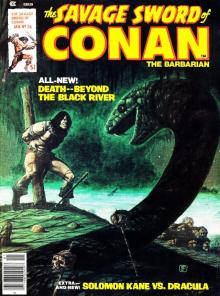 Beyond the Black River
Beyond the Black River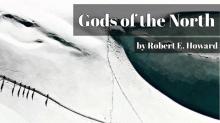 Gods of the North
Gods of the North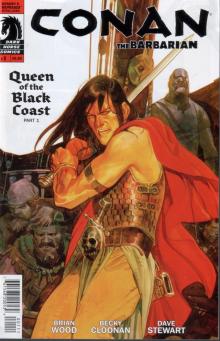 Queen of the Black Coast
Queen of the Black Coast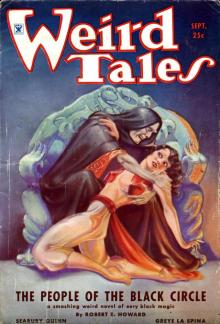 The People of the Black Circle
The People of the Black Circle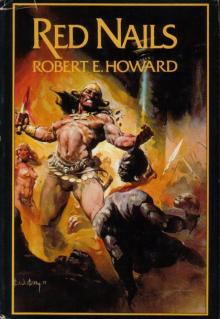 Red Nails
Red Nails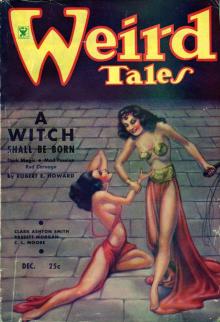 A Witch Shall Be Born
A Witch Shall Be Born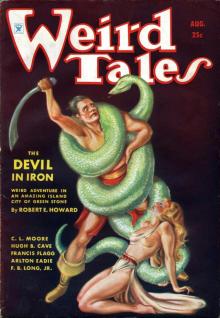 The Devil in Iron
The Devil in Iron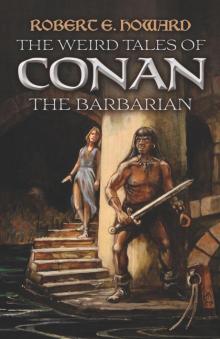 The Weird Tales of Conan the Barbarian
The Weird Tales of Conan the Barbarian The Bloody Crown of Conan
The Bloody Crown of Conan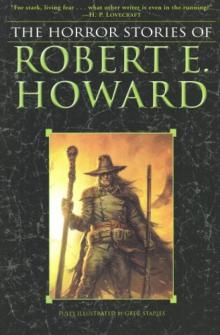 The Horror Stories of Robert E. Howard
The Horror Stories of Robert E. Howard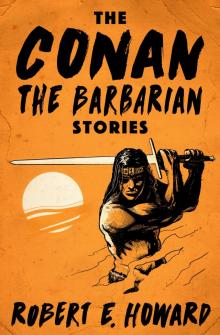 Conan the Conqueror
Conan the Conqueror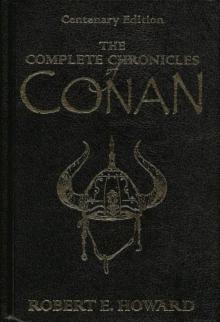 Conan the Barbarian
Conan the Barbarian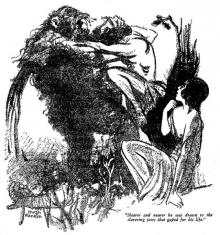 Shadows in the Moonlight
Shadows in the Moonlight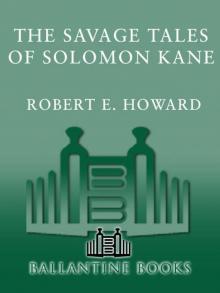 The Savage Tales of Solomon Kane
The Savage Tales of Solomon Kane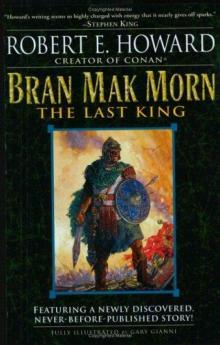 Bran Mak Morn: The Last King
Bran Mak Morn: The Last King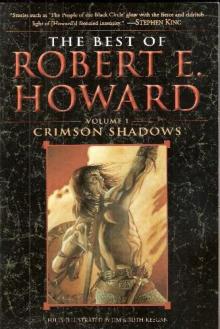 The Best of Robert E. Howard Volume One: Crimson Shadows
The Best of Robert E. Howard Volume One: Crimson Shadows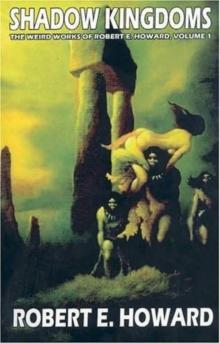 The Best of Robert E. Howard: Crimson Shadows (Volume 1)
The Best of Robert E. Howard: Crimson Shadows (Volume 1)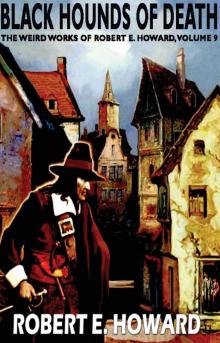 Black Hounds of Death
Black Hounds of Death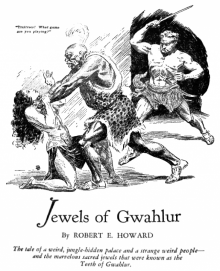 Jewels of Gwahlur
Jewels of Gwahlur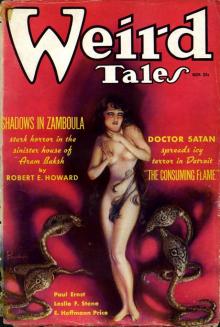 Shadows in Zamboula
Shadows in Zamboula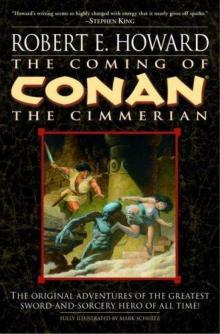 The Coming of Conan the Cimmerian
The Coming of Conan the Cimmerian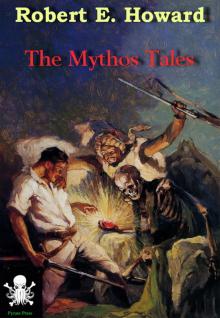 The Mythos Tales
The Mythos Tales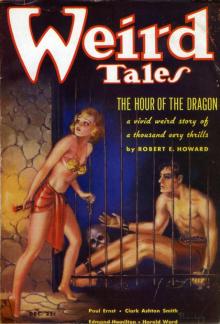 The Hour of the Dragon
The Hour of the Dragon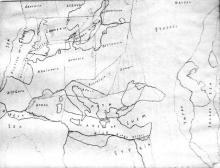 The Hyborian Age
The Hyborian Age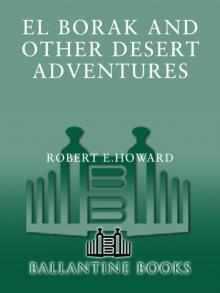 El Borak and Other Desert Adventures
El Borak and Other Desert Adventures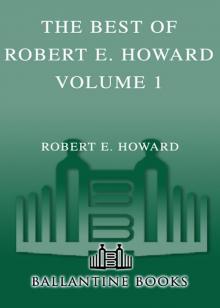 The Best of Robert E. Howard Volume 1 The Best of Robert E. Howard Volume 1
The Best of Robert E. Howard Volume 1 The Best of Robert E. Howard Volume 1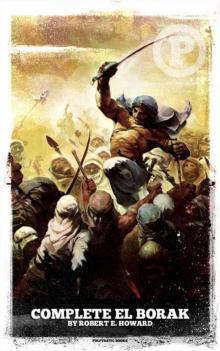 El Borak: The Complete Tales
El Borak: The Complete Tales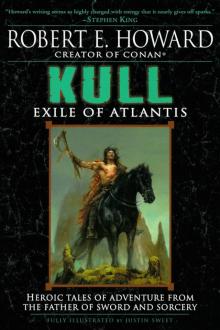 Kull: Exile of Atlantis
Kull: Exile of Atlantis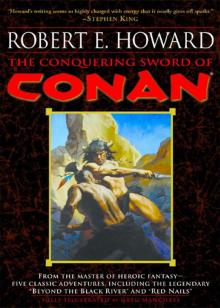 The Conquering Sword of Conan
The Conquering Sword of Conan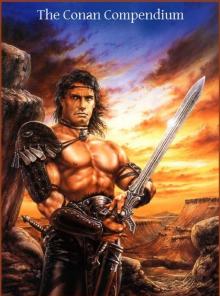 The Conan Compendium
The Conan Compendium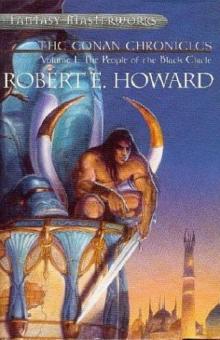 The Conan Chronicles: Volume 1: The People of the Black Circle
The Conan Chronicles: Volume 1: The People of the Black Circle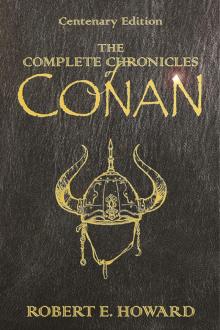 The Complete Chronicles of Conan: Centenary Edition
The Complete Chronicles of Conan: Centenary Edition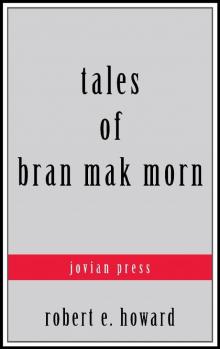 Tales of Bran Mak Morn (Serapis Classics)
Tales of Bran Mak Morn (Serapis Classics)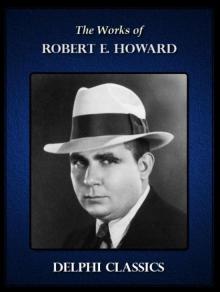 Delphi Works of Robert E. Howard (Illustrated) (Series Four)
Delphi Works of Robert E. Howard (Illustrated) (Series Four)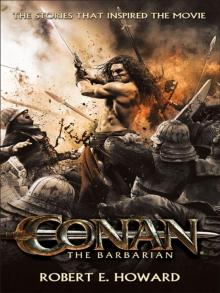 Conan the Barbarian: The Stories That Inspired the Movie
Conan the Barbarian: The Stories That Inspired the Movie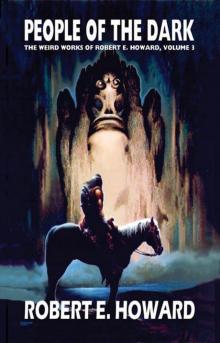 People of the Dark Robert Ervin Howard
People of the Dark Robert Ervin Howard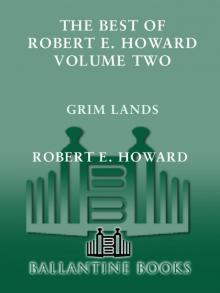 Grim Lands
Grim Lands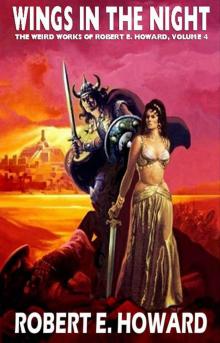 Wings in the Night
Wings in the Night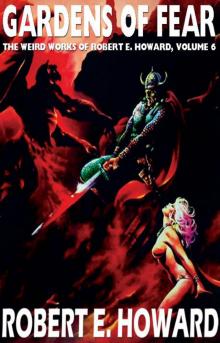 Gardens of Fear
Gardens of Fear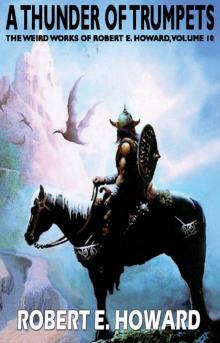 A Thunder of Trumpets
A Thunder of Trumpets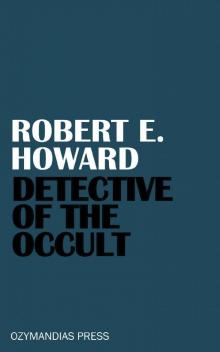 Detective of the Occult
Detective of the Occult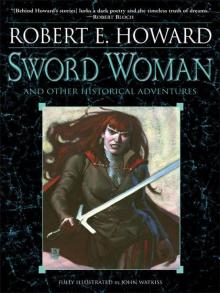 Sword Woman and Other Historical Adventures
Sword Woman and Other Historical Adventures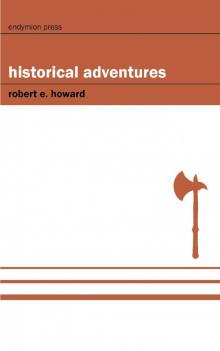 Historical Adventures
Historical Adventures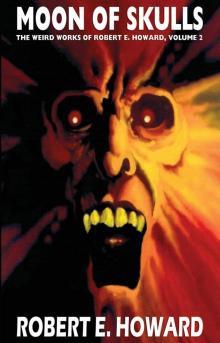 Moon of Skulls
Moon of Skulls The Robert E. Howard Omnibus: 97 Collected Stories
The Robert E. Howard Omnibus: 97 Collected Stories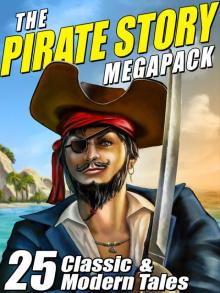 The Pirate Story Megapack: 25 Classic and Modern Tales
The Pirate Story Megapack: 25 Classic and Modern Tales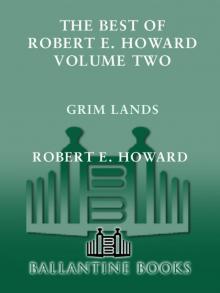 The Best of Robert E. Howard, Volume 2
The Best of Robert E. Howard, Volume 2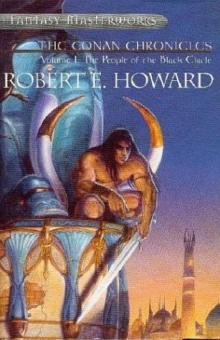 The Conan Chronicles, Vol. 1: The People of the Black Circle
The Conan Chronicles, Vol. 1: The People of the Black Circle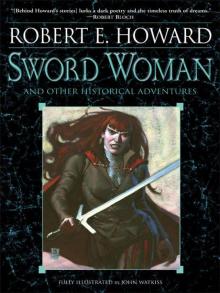 Sword Woman and Other Historical Adventures M
Sword Woman and Other Historical Adventures M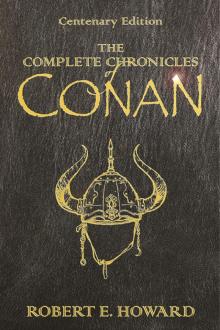 The Complete Chronicles of Conan
The Complete Chronicles of Conan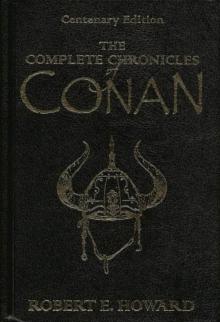 Conan the Barbarian: The Chronicles of Conan (collected short stories)
Conan the Barbarian: The Chronicles of Conan (collected short stories)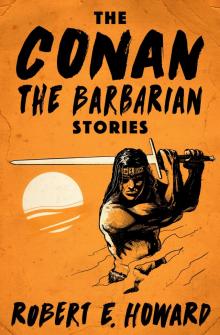 The Conan the Barbarian Stories
The Conan the Barbarian Stories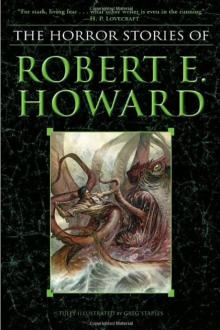 The Best Horror Stories of
The Best Horror Stories of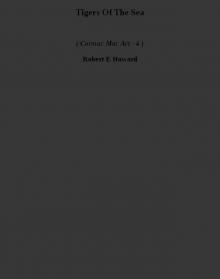 Tigers Of The Sea cma-4
Tigers Of The Sea cma-4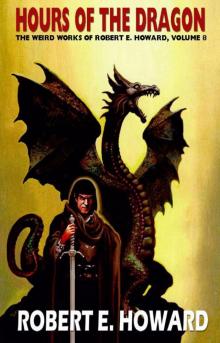 The Hours of the Dragon
The Hours of the Dragon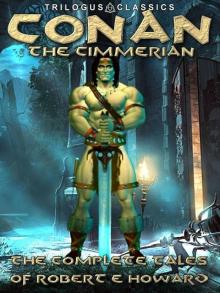 Conan the Cimmerian: The Complete Tales (Trilogus Classics)
Conan the Cimmerian: The Complete Tales (Trilogus Classics)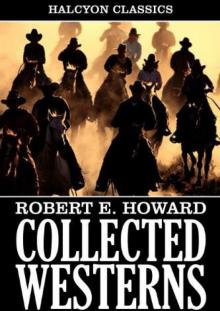 Collected Western Stories of Robert E. Howard (Unexpurgated Edition) (Halcyon Classics)
Collected Western Stories of Robert E. Howard (Unexpurgated Edition) (Halcyon Classics)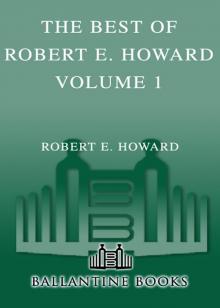 The Best of Robert E. Howard, Volume 1
The Best of Robert E. Howard, Volume 1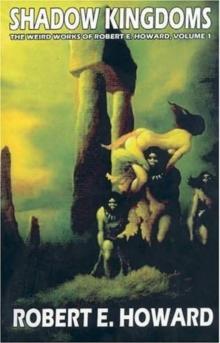 Shadow Kingdoms
Shadow Kingdoms